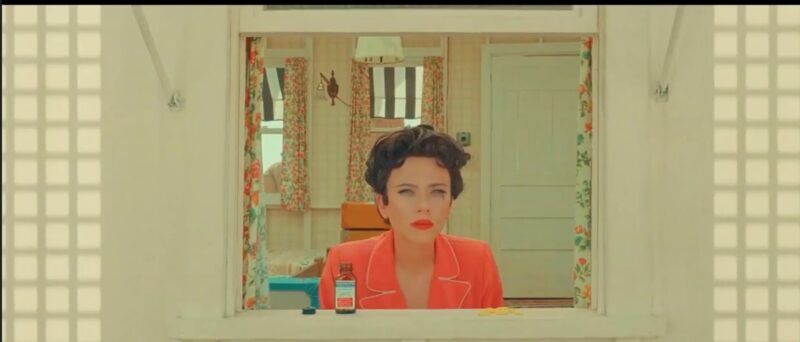Few filmmakers impose a visual stamp on their work as much as Wes Anderson. It has evolved over nearly a dozen movies, to a point where it is now more of a hindrance than a help.
Anderson’s first movies, Bottle Rocket (1996) and Rushmore (1998), were like a breath of fresh air, naturalistic in form, but with characters that were immediately engaging. Anderson immediately gained a loyal following.
That admiration increased when he added more flourishes to his style, marking him apart as a unique talent. The animated Fantastic Mr Fox (2009), Moonrise Kingdom (2012), The Grand Budapest Hotel (2014) and Isle of Dogs (2018) took him into more fantastical territory. The subject matter alone was impressively original, ranging from the rise of fascism in central Europe to a world overcome by rubbish and dogs.
But The French Dispatch (2021) was a step too far, for me at least, putting technical ingenuity above content. His use of symmetrical framing, pastel colour palettes and a large cast of A-list “walk-ons”, looked like an expensive hoax.
A bevy of A-listers are also in Asteroid City (Universal) – among them Tilda Swinton, Tom Hanks, Bryan Cranston, Matt Dillon, Steve Carell, Scarlet Johansson, Adrian Brody, Margot Robbie, and Lief Schreiber – but the artifice is overwhelming. It echoed the blockbuster hit Barbie, which took $4.6 million in its first week alone.
Anderson creates two worlds for his play-within-a-play plot structure. One is the dreary black-and-white set of a 1950s television production; the other is a Barbie-bright desert town, where atomic testing is occurring on the horizon.
To the stirring music of western tunes (“Last Train to San Fernando”), a recently widowed photographer (Anderson regular Jason Schwartzman), nerdy son (Jake Ryan) and three daughters, arrive in Asteroid City for the 1955 Junior Stargazer Convention.
Also in attendance are military types to judge the youngsters’ inventions, an Elizabeth Taylor lookalike movie star (Johansson), and a famed astronomer (Swinton), who conjures up a visitor from outer space.
These bare elements of the plot are fleshed out by a fascinating array of props, from trains (inevitably accompanied by “Freight Train, Freight Train, Going So Fast”) to vending machines selling worthless real estate.
The various framing devices, including slides that tell you what scenes are coming up and what might be happening, are messy, and confirm just how manipulated you feel while watching.
I didn’t see any profundity coming from this, though the audience liked the many one-liners, and a few standout scenes, such as the little girls deciding what to do with the cremated remains of their mother in a Tupperware container.
Anderson may have intended an elaborate design with his collection of comic sketches – or not. But at least they aren’t boring, and tumble out as if they foretold the Barbenheimer phenomena with its union of Barbie’s plasticky, fluorescent world, and mushroom clouds from the atom bombs going off in the background.
Here’s hoping Anderson’s next feature, the animated The Wonderful Story of Henry Sugar for Netflix goes back to basics.
Rating: Mature audiences. 105 minutes.
CLIPS
Chevalier
(Searchlight/Disney)
The story of Joseph Bologne, a champion fencer, virtuoso violinist, and accomplished composer and conductor, is more than worthy, given his background and lack of historic recognition. He was the son of a French plantation owner in Guadeloupe and a slave in the 18th century. In the pre-Revolutionary court of Queen Marie Antoinette, he was admired for his talent and charisma, achieving the honour of Chevalier de Saint-Georges. But he sacrificed this by siding with the revolutionaries. His life’s work was lost to posterity and was only recently recognised. This American-made production in English is lavish in its costuming, but staid and pedestrian in its staging. No blame can be put on three of its leads, Kelvin Harrison Jr (Bologne), Lucy Boynton (Marie Antoinette), and Samara Weaving as an opera singer with whom Bologne has an affair. The self-conscious script overdoes the gender and racial themes, while failing to present the background events with any depth.
Rating: Parental guidance advised. 108 minutes.
Perfect Days
(Madman)
The great German director Wim Wenders, whose career started in 1970, and helped launch that country’s film industry on the international scene, shows the value of experience, as his camera follows a reclusive, traditionalist workman on his daily round of cleaning some of Tokyo’s most unusual public toilets, built for the Olympic Games in 2022. Shot in just 16 days, and displaying all the restraint of Japan’s own famous directors, this is contemplative cinema at its best. Koji Yakusho won the best actor award at this year’s Cannes festival for his performance, which depicts dignity and commitment in even the most menial activity. His routine, which includes reading novels by William Faulkner and Patricia Highsmith, is briefly broken by the arrival of his niece, who soon appreciates her uncle’s qualities, while sharing his interest in 1960s and 1970s rock music by the likes of The Animals and Lou Reed.
Rating: Mature audiences. 123 minutes.
Spin Me Round
(Sony)
Alison Brie (Promising Young Woman), accompanied by Aubrey Plaza (Emily the Criminal), lift this adult romance of naïve Americans seeking love in Italy to a level that, while not reaching the heights of Audrey Hepburn all those years ago, is more than passable entertainment. Brie wins a prize from the Italian restaurant she works for in California to attend a cooking course in Tuscany. But all is not what it appears when she arrives to find a decidedly dodgy outfit. But she is soon overwhelmed by the charismatic rich guy (Alessandro Nivola), who is pulling all the strings. Plaza first appears as his mysterious girlfriend, who takes Brie to places she ought not go. They then pair up as the plot twists and red flags continue, while events turn nasty. Co-writer-director Jeff Baena does a neat job of putting the knife into romantic illusions. Available for streaming on Neon.
Rating: R16. 100 minutes.

Reader Interactions